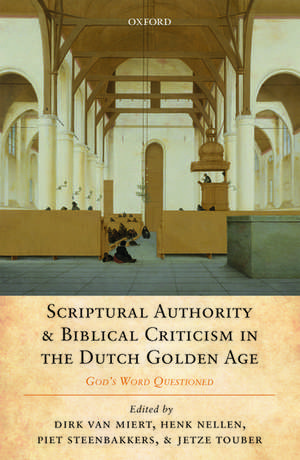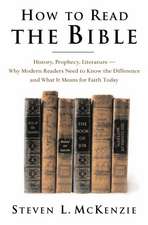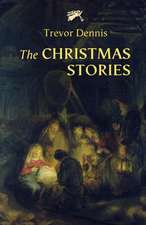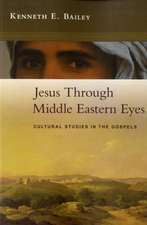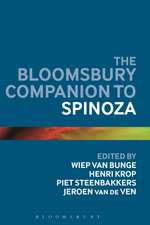Scriptural Authority and Biblical Criticism in the Dutch Golden Age: God's Word Questioned
Editat de Dirk van Miert Autor Henk Nellen Editat de Piet Steenbakkers, Jetze Touberen Limba Engleză Hardback – 12 oct 2017
Preț: 765.08 lei
Preț vechi: 1095.24 lei
-30% Nou
Puncte Express: 1148
Preț estimativ în valută:
146.44€ • 159.12$ • 123.09£
146.44€ • 159.12$ • 123.09£
Carte tipărită la comandă
Livrare economică 09-15 aprilie
Preluare comenzi: 021 569.72.76
Specificații
ISBN-13: 9780198806837
ISBN-10: 0198806833
Pagini: 466
Dimensiuni: 168 x 241 x 33 mm
Greutate: 0.85 kg
Editura: OUP OXFORD
Colecția OUP Oxford
Locul publicării:Oxford, United Kingdom
ISBN-10: 0198806833
Pagini: 466
Dimensiuni: 168 x 241 x 33 mm
Greutate: 0.85 kg
Editura: OUP OXFORD
Colecția OUP Oxford
Locul publicării:Oxford, United Kingdom
Recenzii
At their strongest, the chapters in this volume begin to put forward intriguing and significant new interpretations of seventeenth-century biblical scholarship. ...they reveal a snapshot of a subject in rapid transition, one increasingly focused on new--and more interesting-- questions, which have the promise to alter our understanding of early modern biblical scholarship.
gives an idea of the wide scope of early modern biblical philology, avoiding the pitfall of focusing only on elements that fit our present picture of "modernization".
the volume gives a wonderful overview of Dutch seventeenth-century biblical scholarship in the Golden Age, from orthodox, libertine, and Jewish points of view, and even in the period after the Golden Age Republic had waned in the 1670s. Of course, not everything or everybody is covered, but those who want to learn about seventeenth-and early eighteenth-century biblical scholarship will find much valuable in this collection of essays.
This is a useful and in several cases outstanding collection of essays that confirm the longer-term significance of late humanist biblical scholarship and explain several otherwise inexplicable aspects of the passage from post- Reformation and Renaissance intellectual culture into the early Enlightenment... The essays gathered in this volume show that historians of biblical criticism are beginning but only just to understand what it will take to write a multi-faceted, fully contextualized account of their subject.
By treating biblical philology as an engine of religious and philosophical innovation, this book adds to a growing body of new work that highlights the thick lines of continuity running from Renaissance humanism and Reformation-era controversies to the Enlightenment. It will benefit not just specialists in early modern biblical scholarship but anyone interested in the intellectual origins of modernity.
gives an idea of the wide scope of early modern biblical philology, avoiding the pitfall of focusing only on elements that fit our present picture of "modernization".
the volume gives a wonderful overview of Dutch seventeenth-century biblical scholarship in the Golden Age, from orthodox, libertine, and Jewish points of view, and even in the period after the Golden Age Republic had waned in the 1670s. Of course, not everything or everybody is covered, but those who want to learn about seventeenth-and early eighteenth-century biblical scholarship will find much valuable in this collection of essays.
This is a useful and in several cases outstanding collection of essays that confirm the longer-term significance of late humanist biblical scholarship and explain several otherwise inexplicable aspects of the passage from post- Reformation and Renaissance intellectual culture into the early Enlightenment... The essays gathered in this volume show that historians of biblical criticism are beginning but only just to understand what it will take to write a multi-faceted, fully contextualized account of their subject.
By treating biblical philology as an engine of religious and philosophical innovation, this book adds to a growing body of new work that highlights the thick lines of continuity running from Renaissance humanism and Reformation-era controversies to the Enlightenment. It will benefit not just specialists in early modern biblical scholarship but anyone interested in the intellectual origins of modernity.
Notă biografică
Dirk van Miert is Assistant Professor of Early Modern Cultural History at the University of Utrecht.Henk Nellen is Senior Research Member at the Royal Netherlands Academy of Arts and Sciences at Huygens Institute for the History of the Netherlands, and Emeritus Professor of the History of Ideas of Early-Modern Times in the Erasmus School of History, Culture and Communication, Erasmus Universiteit, Rotterdam.Piet Steenbakkers is Senior Lecturer of the History of Modern Philosophy in the Department of Philosophy and Religious Studies at the University of Utrecht, and Emeritus Professor of Spinoza Studies at the Erasmus Universiteit, Rotterdam.Jetze Touber is Lecturer in the Department of Languages, Literature, and Communication at the University of Utrecht.
